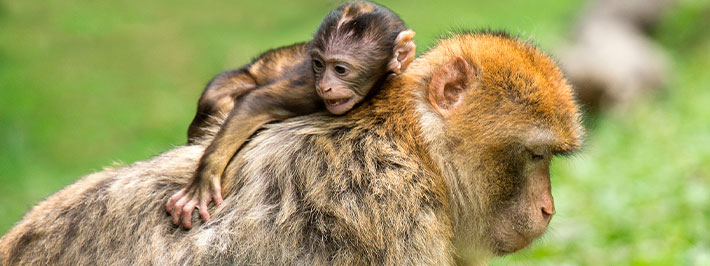
Everything you need to know about monkeypox
Since May 14, 2022, confirmed cases of monkeypox virus infection not directly related to travel to West or Central Africa have been reported in eight European countries: United Kingdom, Portugal, Spain, Sweden, Italy, Belgium , United States and Canada.
Suspected cases are being tested in many countries, including Australia, and the situation is changing rapidly. How is this infection transmitted? What symptoms should alert? Should we fear a new pandemic?
As Europe kicks off its summer season ... with gatherings, festivals and parties, I'm afraid the transmission is speeding up, said the WHO's director for Europe, Hans Kluge.
Monkeypox: what symptoms should alert?
Monkeypox, also called "simian orthopoxvirus", is transmitted by a specific virus, "monkeypox". It is a rare viral zoonosis, seen mainly in isolated areas of central and western Africa, near tropical rainforests. It was discovered in the 1970s, in the Democratic Republic of the Congo, after smallpox was eradicated thanks to the vaccine.
The World Health Organization states that: "The clinical presentation is similar to that seen in patients with earlier smallpox, but less severe." The incubation of the disease can vary from 5 to 21 days. Generally benign, most of the time it heals spontaneously, after 2 to 3 weeks.
In the first phase, called "invasive", we distinguish:
fever (1 to 3 days),
severe headaches,
Inflamed glands,
back and muscle pain,
lack of energy.
Then comes a second period, characterized by the appearance of a rash (first on the face, then on the rest of the body). "It evolves in about ten days from maculo-papules (flattened-based lesions) to vesicles (small fluid-filled blisters), then pustules and finally scabs," specifies the WHO.
What to do in case of symptoms?
If symptoms appear (fever and rash with blisters), contact your health center. It is recommended that you isolate yourself while awaiting medical advice and avoid contact with other people.
How do I know if I have monkeypox?
To diagnose the disease, it is necessary to submit a sample that will be analyzed in the laboratory.
"Monkeypox": how is the virus transmitted?
Monkeypox is transmitted mainly to humans through contact with wild animals: "African rodents and non-human primates (such as monkeys) can harbor the virus and infect humans", specifies the US Agency for the control and disease prevention. But secondary (human-to-human) transmission remains limited.
It is often the result of direct and close contact with infected secretions from the respiratory tract (saliva, sneezing, crackling, etc.), lesions on the skin or mucous membranes of a sick person. It can also be contaminated "indirectly", through contact with objects recently contaminated with biological fluids, or materials from a patient's injuries (bedding, clothing, dishes, etc.).
"Generally, transmission occurs through the respiratory route, but the alleged cases of infection suggest that transmission occurred through the mucous membranes during sexual intercourse," said the Spanish health authorities upon discovering the first cases. The patients are experiencing "positive development," they added.
Monkeypox: those over 50
According to Professor Jean-Daniel Lelièvre, head of infectious diseases at the Henri-Mondor hospital, interviewed by Le Parisien, 50-year-olds, vaccinated against smallpox before the 1970s, can very quickly produce antibodies against their cousin. , monkeypox.
What is the treatment for monkeypox?
There is no specific treatment or vaccine that can prevent monkeypox. Patients usually recover spontaneously, within two to three weeks.
In January 2022, the European Medicines Agency (EMA) approved a drug called Tecovirimat and it was found to be "effective in reducing mortality from smallpox, monkeypox, and cowpox based on animal studies." This medicine currently has a marketing authorization for exceptional circumstances only. As stated by the EMA "it has not been possible to obtain complete information on Tecovimat due to the rarity of these diseases. The Agency will review any new information that becomes available and, where appropriate, will update this summary".
Is there a vaccine? For whom ? In which countries?
Although there is not yet a vaccine to treat monkeypox, vaccination against human smallpox is also effective against the form transmitted by monkeys: about 85% effective, according to the Pasteur Institute.
However, on May 24, the High Health Authority recommended a reactive vaccination strategy for "adults whose contact with an infected person is considered to be at risk, including exposed health professionals without individual protection measures."
This vaccination schedule should be implemented "ideally within 4 days after the risk contact and a maximum of 14 days later with a two-dose schedule (or three doses in immunocompromised subjects), spaced 28 days apart. This vaccination should be achieved only with a third -generation cow.
This French recommendation echoes that made by US health authorities who announced on May 23 that they wanted to "maximize the distribution of the vaccine to those who have been in contact with a known monkeypox patient, such as caregivers, very personal contacts , loved ones, especially those at risk of developing a severe case of the disease."
Monkeypox Infection: Can You Die From It?
The case fatality rate in monkeypox outbreaks is 1-10%, but with proper care, most patients recover, the WHO says.